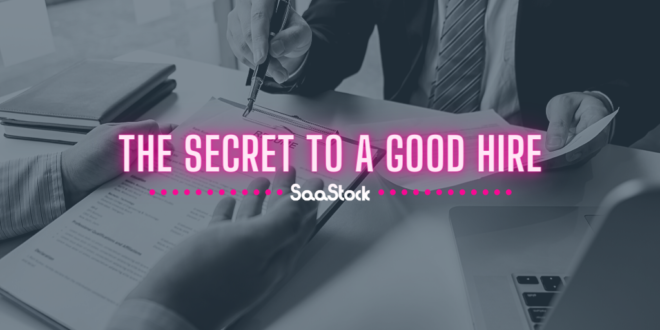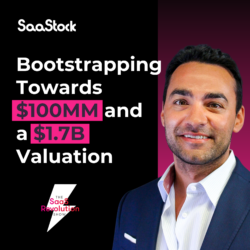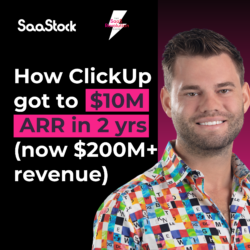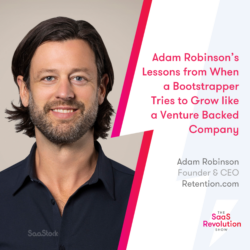If you are not subscribed, join the community by subscribing here and share it with your fellow SaaS enthusiasts.
How do you avoid making a bad hire?
The rule is to:
“Hire on attitude”, according to Dan Martell, Founder of SaaS Academy.
What to tactically look for in interviews, especially with executives or leadership team members, is to get clarity on what they want their life to look like in the next five years.
- Where do they want to live?
- How do they want to structure their day?
- What kind of responsibilities do they want to have?
- Do they want to run their own business?
Watch now:
You want to make sure that the role that you need them to play is aligned with their desired outcome for their life.
They’ll invest so much into building that within your company naturally because they want to learn the skills, the processes, the tools, so that they can do it for themselves in the future.
To get more insights from Dan, watch his full 500 words of wisdom on our YouTube channel. You can also read the full transcript of this video below.👇
Transcript
What’s the biggest challenge you’ve faced? How did you overcome it?
Dan Martell:
One of the biggest challenge that I’ve ever we’re faced in my entrepreneurial career was when we were building a company called Flowtown. We were probably about two years into it, about 160K in MRR, our recurring revenue. We were using Facebook’s API, open API. And they got in trouble with some privacy issues and caused them to change the way that API worked, which was crucial to how our software Flowtown worked. Essentially we were a social marketing platform for small businesses. And we got an email notifying us of essentially the API changing would literally render our software useless and we had 60 days to fix it. And at the moment it happened, essentially, my heart sank, my co-founder turned white. He was freaking out. I had gone through some challenges in my businesses prior to that so I knew that that was kind of the game we were playing. He took it a little harder.
After a day of moping, I told him to meet me at the office. We essentially just white boarded different ideas. We audited the customers we had, the problems that they were solving, the experience and knowledge and resources that we had as a team. Obviously, we had to right size the team to give us more runway. But then, we quickly prototype three different ideas, tested them in the market using the lean startup methodology. Eric Ries was one of our advisors in that process. And eventually decided on one of them, that was a different market but because we had a blog at 100,00 unique visitors per month, we were able to pivot our traffic, our resources, our marketing, towards that customer segment and literally rebuild a revenue base over an 18-month period, and eventually getting acquired by a company called Demandforce that eventually got bought by Intuit for about $500 million three months later.
So to go from almost getting shut down, which was one of the hardest things because we had investors, we had our team, to turning that around in a two-year period is a great success story. But while we were going through it, it was the reason for all this grey hair. It was challenging.
Flash back to the start of your career, something you wish someone had taught you early on?
Dan Martell:
The thing I wish somebody would have taught me early on is to choose a problem that you want to solve that you’re willing to dedicate a decade to. I think one of the biggest mistakes or challenges, right? I don’t think of mistakes. I just think mistakes are experiments that ran too long. The experiment that ran too long was trying different things because of business or market opportunities and not focusing on a problem for a decade.
And I think that when I started shifting my perspective to a longer term horizon, that’s when all my business success came from. Even though, if you look at my career, building and exiting Flowtown in kind of the two and a half years, three years, same thing with Clarity in three years, my previous company is Spheric in four years, it kind of looks like I was doing a bunch of different things, but when I started them, I definitely took a 10-year horizon. I focus on the big picture. And today that’s still part of the thesis. I just think a lot of early entrepreneurs are looking for market opportunities and not asking themselves, “Hey, you’ll probably be successful. So what wall is that ladder of success leaning against?” And once you get to that top of that ladder and you look around, “Are you happy with where you spent that time?” Because if you’re successful in something you don’t care about, it’s going to make it really hard to be passionate and focus on it for a decade.
How do you stay productive in your day-to-day? Number 1 life-hack that keeps you focused?
Dan Martell:
I’ve got two apps. I know it’s one hack, but it’s the same… They’re used in tandem, okay? There’s two apps. I have very severe ADHD. I was on medication for most of my life. Probably eight years ago I decided to… Well, it’s been almost a decade now. I decided to get off the medication, but obviously, I still need to produce and be available and not be a degenerate to my team and not let balls just fall behind. So I use two apps. One is called Be Focused Pro, which is a timer app on my computer. It uses a Pomodoro technique, 25-minute increments, five minute resets. So essentially, it’s this gamified experience for me when I’m doing deep work, creative thinking, creative writing, that kind of stuff, where I try to get as many of these cycles done early in the morning. And while that’s happening, I listen to an app called Focus@Will, which is a music app that’s designed to help people focus their attention. So both of those in tandem is how I remain incredibly focused on outcomes and output even though I naturally get distracted quite easily.
What’s the secret to a good hire? How do you avoid making a bad hire?
Dan Martell:
The secret for good hiring, and I’ve hired over 700 people in my career at this point, that I love to map. I think it’s definitely not skills. If you think of the people you admire the most and you say, “What do you admire about them?”, skills are not going to be listed amongst those attributes. Attitude will be, right? Driven, ambitious, tenacious, outgoing, et cetera. My rule is we hire on attitude, but what I’m looking for tactically in my interviews, especially with executives or leadership, team members, is getting really clear what they want their life to look like in the next five years. Where do they want to live? How do they want to structure their day? What kind of responsibilities do they want to do? Do they Want to run their own business, et cetera? Because what I’m looking for is to make sure that the role that I need them to play is aligned with their desired outcome for their life.
Because the way I think about it ism if their most selfish moment of wanting things out of life is aligned with what I need them to do for my company, then that’s a win-win. Meaning that if I need somebody to come in and build a whole marketing team and their mission is to have their own marketing agency, then they’ll invest so much into building that within my company naturally because they want to learn the skills, the process, the tools, so that they can do it for themselves in the future. That’s one of my hardcore tips that I look for every time I hire especially senior people.
Your 3 biggest goals for 2021, personal or professional?
Dan Martell:
The three biggest goals I’ve got is there’s two Ironmans I’m doing, my first official half. I did one that was unofficial last year and then a full, so that’s a big training commitment. Second is acquiring three SaaS companies. Last year, I acquired my first and I’m looking to kind of build my own portfolio of incredible founders that want to partner with me on really scaling their businesses up. And then, the other one is just spend more time in nature, which with COVID relegating myself and the family to our house for the most part in 2020, 2021, we’ve deemed it as that, and we actually moved to the mountains. And so far, we’re off to the races on that goal, but definitely 10Xing the amount of time spent in nature this year.
Number one biggest mistake you see founders make on their scaling journey? And how can they avoid or overcome it?
Dan Martell:
The number one mistake is not developing their people. One of my rules in scaling companies is that we build the people and the people build the business, and looking at your team as opportunities to develop them to grow not only to create outcomes for yourself, but to be an example for their teams as we grow. Usually, the first 12 people are going to decide your success. Of hiring those 12 people, they should be folks that can manage other people because that’s how we get leverage. And then, the crux of that strategy is the desire to develop. The more you develop yourself, the more you’ll have to pour into other people. I think that’s one of the challenges for a lot of entrepreneurs that have never built a company before is, they don’t feel like they’re capable of leading other folks, their leadership team. I think it’s just because they stopped investing in themselves, stop consuming books, mentor groups, hiring a coach, being around other successful peers and sharing those ideas so you have more to contribute to their team. But build the people, the people will absolutely build the business.
What do you think the most effective SaaS marketing channel will be in 2021?
Dan Martell:
This is an interesting question. The most effective will be Facebook. The most interesting is Clubhouse. I’ll focus on Facebook, but I do want to make sure that Clubhouse gets a mention. The strategy for making Facebook work, especially if you’re a B2B SaaS founder, the easiest one is to partner with influencers in your market that you serve, folks that your customers know of, maybe they’re agency owners, they’re speakers at events. Co-host a webinar with them teaching three things that helps them overcome a specific problem that your software solves. And by doing that, you can run paid acquisition on Facebook to generate audience for the webinar. The value is the speaker you brought in, that influencer, but you start to build a pipeline for potentially talking to customers or buyers that are interested in your solution. So Facebook, still undisputed most effective, cheaper than LinkedIn, still, for B2B SaaS. The strategy and the funnel is industry influencers to deliver the content, so you don’t have to do that. But you can run the ads to build the list and build your pipeline.







